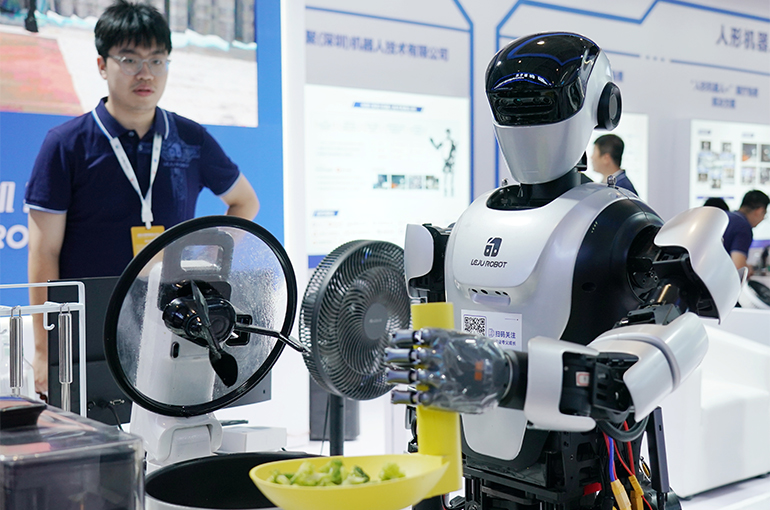 Androids Take Center Stage at Beijing's World Robot Conference
Androids Take Center Stage at Beijing's World Robot Conference(Yicai) Aug. 26 -- Humanoid robots stole the spotlight at the five-day World Robot Conference in Beijing amid growing interest in artificial intelligence technologies.
The WRC that ended yesterday attracted 169 exhibitors, displaying more than 600 innovative products, including a record-high for the decade-old conference 27 humanoid robots.
Hangzhou-based Unitree showcased the Unitree G1, its 127-centimeters tall and 35-kilogram heavy android that can move 2 meters per second and perform precise hand movements, priced at CNY99,000 (USD13,895).
Established in 2016, Unitree initially focused on the quadruped robot field, founder Wang Xingxing told Yicai. However, with global attention on humanoid robots growing, the company ventured into this sector early last year, Wang added.
The biggest factor behind this recent wave of interest in androids is AI, Wang noted. The rapid advancement of AI technologies has led people to believe that humanoid robots can create more value, something completely unimaginable ten years ago, Wang pointed out.
The Beijing Embodied AI Robotics Innovation Center displayed the upgraded Tiangong humanoid robot with new voice interaction capabilities thanks to integrating a large language model. It can also perform other tasks, such as grabbing and placing objects based on human voice commands.
Ubtech Robotics presented Walker S Lite, its industrial humanoid robot, Hao Baoyu, vice president of the Shenzhen-based firm, said to Yicai. The android has been "employed" by several car factories, including assisting workers at Zeekr Intelligent Technology, the electric vehicle arm of Chinese auto giant Geely Automobile Holdings, Hao added.
The development of LLMs has significantly enhanced robots' ability to sequence and execute complex tasks, Cao Wei, a partner at Lanchi Ventures, told Yicai. Under traditional algorithms, the success rate of robots performing tasks was around 50 percent, a basic laboratory level, but with the support of LLMs, this increased to over 50 percent, with some even reaching 100 percent, gradually approaching commercial viability, Cao noted.
China is a highly promising market for robots, according to Cao. Robots will likely become a key technology for addressing the aging population and labor shortages, Cao said, adding that the country has a very strong talent pool, with over 400 universities offering robotics programs.
Editors: Dou Shicong, Martin Kadiev